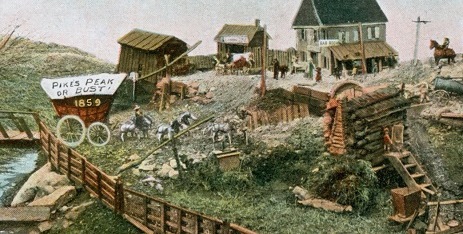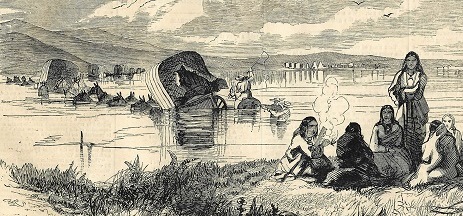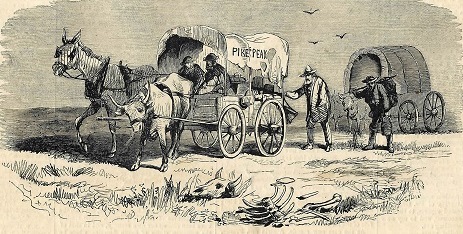| Home |

|
Pike's Peak or Bust - And |
|
Memorable Trip Across the Great Plains in Gold Rush of 1859, as Related by One of the Survivors Sixty-seven Years After the Event - Personal Recollections of the Great Adventure - by William Meyers Schrock |
 |
| Wagon of gold miners en route to Pike's Peak |
Following is the second installment of the personal recollections of Captain William M. Schrock of the part he and a number of companions, including Jonas J. Beachy of Grantsville, Md., took in the Pikes Peak gold rush of 1859. Captain Schrock is now 89 years old, and Mr. Beachy 95. --Editor [Meyersdale (PA) Republican].
Nothing special occurred for a number of days and we were making good time. Reaching the top of a rise in the ground, a vast low prairie lay before us, where the year before there had been an immense crop of tall grass, with the new just beginning to show through the old. Suddenly one of the men said: "See, yonder is a prairie fire!" It was travelling with marvelous rapidity. We were going west. The fire was moving in a north-easterly direction and crossed our path not more than 1,000 feet away.
Our view could not have been better. It was awe inspiring. No human being, no horse, no bird, no animal of any kind could have gotten away; not even the fleet-footed elk or deer could get out of its way. The flames seemed to roll or leap as much as 100 feet or more at a bound, then make another leap. Sixty-seven years later, I can still see, as it were, that mad rushing, jumping, hissing prairie fire. Not many are living in this day and generation that ever saw the like; it simply was fierce and a spectacle never to be forgotten.
~ A Prairie Storm. ~
Several days after seeing the prairie fire it was noticed at 4 or 5 o'clock in the afternoon, that heavy banks of dark clouds were coming up from the west. We at once struck camp; some of the boys looked after the cattle and horses, tents were quickly put up, and supper was looked after by others.
The clouds seemed very near the earth, with flashes of lightning and heavy rolling thunder which seemed to make the earth tremble. Preparations were quickly made to meet the storm which threatened to break any minute.
As cattle and horses do not lie down during a rain storm, it was thought best to make a detail of three men to serve as guards over the cattle until midnight, and three others to serve from midnight until morning.
The writer volunteered to go out with the first detail; two others stepped out, both from the Ogle County squad -- fine, husky fellows. We started out at 8:30 P. M., in rain accompanied by thunder, such as none of us had ever experienced. Each guard was provided with a rifle and a large water-proof blanket. The writer carried a new double-barreled gun of best make. Unfortunately no one thought of leaving a light in one of the tents to guide us in returning to camp.
~ A Perilous Night. ~
We found the cattle close together with the horses near by, grazing and constantly, but slowly, on the move, I leading us farther and farther from our camp. When midnight came the question arose who would go for the relief. One of the Qgle men picked up a weed and broke it into three lengths. The writer drew the short stick and after a brief consultation as to the direction of the camp, was off. The other guards said later that they had misgivings as to the probability of me ever finding the camp, and as to their ever seeing me again. But they did.
After a full half hour's walk, then midnight and the rain having let up slightly, I halted to determine, if possible, where I was at. I then and there realized the situation and felt that I was lost on the great plains of the far west, of which I had read in my youth and of people having been lost and never heard from later. The stillness which came after the storm, made me shudder. There was not even the screeching of a cricket to relieve the terrible monotony and stillness of the night. But there was one
hope -- the discharge of my rifle might bring some one to my rescue. But alas! the powder had drawn dampness and the gun did not respond.
My dear reader, you can possibly imagine my feelings better than I can express them on paper. Like a flash my mind seemed transferred to my father's. home in the far east. Father, mother, brothers, sister and school-mates passed, as it were, in review before my eyes.
~ Lost on the Plains. ~
The prairie wolf -- of which I will have something to say later on -- was another factor in my dilemma. There was still considerable lightning. This gave me renewed hope. Moving on a pivot, as it were, after each flash, I looked straight ahead. During the first few flashes I saw nothing but the empty landscape. Finally I espied, as I thought, a white speck in the distance. In an instant I was off in that direction and soon found I was approaching camp, an in a little while I was right before my tent. I came near collapsing. I had been lost in a terrible rain and thunder storm on the great plains of the far west.
With a candle I at once signalled the other two guards to have them know that all was well. I promptly awakened the relief and escorted them to the cattle, relieving the remaining two guards. I think Mr. Beachy was in charge of the second relief.
After a few hours rest and sleep I was up and ready for duty by 8 o'clock. In the meantime I again tried my rifle and succeeded in blowing off six inches of the muzzle, some wet earth had evidently gotten into the gun and caused the bursting.
The writer admits that after that night’s experience, he was just a little nervous. As he now recollects the two Glenn brothers were with Mr. Beachy on the second relief. Several of our companions signified a willingness to relieve me from duty for that day, hut I quickly said "No" and that settled the matter without further argument.
~ Platte River Trail. ~
 |
| "Pike's Peak or Bust" wagons trying to ford the Platte River. Harper's Weekly, 1859 |
All the teams pulled out and by o'clock the entire camp was on the move. The trail, after the exceedingly heavy rain, was extremely muddy resulting in slow driving; but with fine sunshine the trail soon improved and all went well. Our party with many others, followed what was known as the Platte River trail, which most of the time a considerable distance from the river, and on the south side of it.
At certain seasons of the year there are, or were, places in the river that could be forded. When pretty well up the stream even then, it was said, there were treacherous places on account of quicksand. A loaded wagon stopping on a bed of quicksand in the river was likely to cause considerable trouble in getting released, because of the sand quickly settling around the spokes. Quicksand is treacherous and hard to deal with, wherever found. Our company had a slight experience with it, but not in the river.
We did not have much trouble as to water for the cattle for a number of days after the thunder storm -- but it was necessary for the men to be saving with water for drinking purposes and a little later with water for the cattle also.
~ Buffalo Wallows. ~
One evening at dusk we halted at what was known as a "buffalo wallow" in those days. The so-called "buffalo wallows" were made by the buffalo themselves for gathering water to drink and to wallow and roll in the mire. They would paw a hole in the earth near as possible to a moist place where water would seep in or be filled by rain, then take a first-class mud bath by rolling and wallowing in the mud and water, until covered with a coat of sticky mud, much of which would remain in the long bushy hair for days, thereby protecting them from annoying, stinging insects.
Some time after leaving the wallow referred to, we had good weather and the trail was in fine condition. There were many others ahead of us and in the rear, all driving toward the Peak. A number of days later, whilst stopping for dinner, with our cattle grazing nearby, a two-horse wagon with two men came driving eastward. One of them asked: "Can we camp along side of you people whilst we take dinner and let our horses graze? When we are ready to leave, we will invite you to join us in our return to
the States. We assure you that you will save time, provisions and money in doing so."
Mr. Beachy, as I remember, exclaimed: "What is wrong with you men? Are you off your base?"
~ Pikes Peak Fizzle. ~
The reply came quickly: "No, we are not off our base, We know what we are talking about. Pikes Peak is a fizzle!"
They bade us good-bye and were off in an instant.
During the next few days we met other outfits going eastward, some of whom said: "We have seen old and experienced miners who said there is very little gold to be dug at or near Pikes Peak."
When accused of having been unnecessarily alarmed, a quick retort would come: "No, we were not unnecessarily alarmed, as you will find out within the next few days -- wait and see." We did see, later.
We soon met five or six more teams returning. The owners all had the same doleful story to relate -- all was disappointment mixed with a little disgust. The next day we passed more than 20 outfits, homeward bound, some of them with the following legend painted or chalked. on the sides of the wagon cover, while going west: "To Pikes Peak or bust." On the return trip chalk lines were drawn over the original inscription, and the following was substituted: "Busted by Heck," or "Busted by Thunder."
We met more than two dozen teams returning on the following day, all with the same doleful story. Our men began to take notice; a few were quite sullen and crestfallen; others were ready and willing to face homeward.
A day later there were more than 200 teams, by actual count, on the back-track. A halt was agreed upon for further information and consultation. The two men with the two-horse wagon concluded to continue on to California. The others of our party voted to return home. Half an hour later the California-bound men were out of sight. None of our company ever heard from or of them again thereafter.
 |
Ragged "Pike's Peak or Bust" wagons crossing the Plains, with bleached cattle bones along the way. Harper's Weekly, 1859 |
~ Turning Backward. ~
Like hundreds of others we at once proceeded to lighten our wagons by dumping out all our mining tools and whatever else could be spared. Thousands of dollars' worth of tools and other belongings were strewn along the trail from hundreds of wagons. Thus lightened the wagons could make much better time toward home.
On our return trip we had several experiences that are worthy of note. About a week or ten days after leaving the turn-table, we struck a small stream, the trail passing around a sharp curve of the stream. As it was near the noon hour we halted for dinner and to rest the cattle, as well as ourselves, for several hours. Some of the men insisted on having dough-nuts for lunch, and we had them; also potatoes, syrup and applebutter, yes, and side-meat and coffee. It was, as I recollect, a joint dinner with all of the Ashton people.
In the meantime a man, and his 15-year-old son drove along side. The man was a stoutly built fellow with long red whiskers. He asked: "Can we camp alongside of you people while we take dinner?" "Why not?" was the reply. "Make yourself at home." He was a fine and agreeable gentleman, also homeward-bound, and said: "I will be much pleased to reach home. I have full plenty and some to spare of the Pikes Peak gold trip."
~ A Walking Skeleton. ~
When we were about through with our dinner, the writer, in casting his eyes toward the turn in the road arose quickly to his feet and exclaimed: "Oh, oh, see a human skeleton approaching with blood all over his bony face and hands!" He could scarcely walk from weakness. The fellow was very little more than bones and ligaments, with skin drawn over. His first words were: "Can you give me something to eat?" All gathered around the man. He was nearly naked. The little he had on was at once stripped from him and he was bathed and furnished with a full suit of clothes. By that time the writer had ready for him a tin cup of coffee with sugar and a broken cracker in it, which the famished man gulped down eagerly and then pleaded for more. “N0, no, not no, but an hour later you shall have another cup,” was the reply. Hi stomach was not in condition to bear more.
Mr. Beachy took especial interest in the skeleton. The Glenn brothers and others also did what they could for the poor fellow. All this. time the red-bearded man was paying close attention to what was being said and done. Briefly, the skeleton said he and two brothers were lost in a rain and sleet storm and a band of five Indians on horseback ran them down, killed one brother and wounded another. The Indians took their provisions, ponies and money.
~ Skeleton's Sad Story. ~
Several days later his remaining brother also passed away from his wounds and exposure. Then, being alone, he began to make a fight for his life. His food was prickly pears and grass roots dug up with his hands, which was plainly shown by hundreds of thorns in his hands. He also exhibited a pocket bible with a deep glancing hole, which he said saved his life. His words were not doubted. He said he had $2.60 in silver in a side pocket that was overlooked by the marauding Indians. Quite an amount of money and supplies had been taken from the brothers. He said he had found a little water in several small ravines, by digging with his hands. He further remarked:
"I wandered hither and thither, hunting the trail, .like a man lost in the woods on a cloudy day. The last three days and nights. I put nothing into my stomach whatever. A few miles back from here I finally struck the trail where I sat down to think, what next. A short time later a man with a two-horse wagon came along. I said to him: "I have $2.50 that I will give you if you will take me in your wagon to the Missouri River. He accepted the money, helped me on his wagon and drove on. A short time later we encountered a sharp little hill, whereupon he directed me to get off and walk up the hill. I pleaded with him that I was too weak and I could not do so, and that I had paid for riding to the river, whereupon he struck me on the head with a heavy cane and pushed me off his wagon and drove on. He is camped just back of the bend of the stream and no
doubt will be along soon."
~ Lynching Frustrated. ~
About an hour later the brute of a man came along and all were ready for the inhuman scoundrel. When the fiend drove up, the man with the red whiskers who ate his dinner near us, stepped out on the trail and sharply exclaimed: "Halt!" The fellow halted very quickly. At the same time, the red-whiskered man produced a rope and said: "Now, gentlemen, I have heard what this unfortunate man had to say of his shameful and in-human treatment. I have this rope ready to hang his abuser to the limb of yon tree (about 25 feet away.)
"Several of you men lend a helping hand, please."
| Originally published in the Meyersdale (PA) Republican, Nov. 25, 1926 |
| Page copyright © 2020 Mark A. Miner |